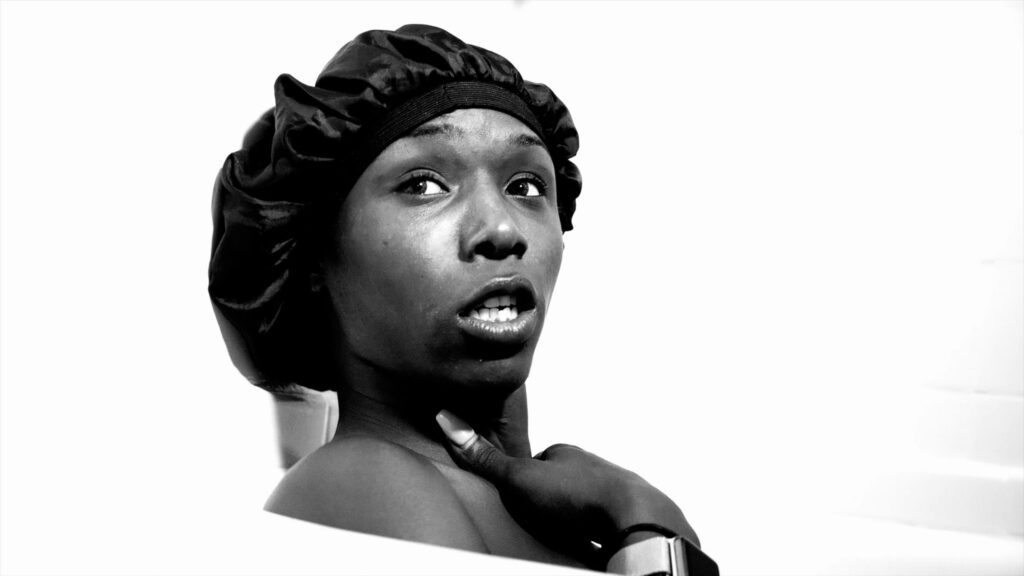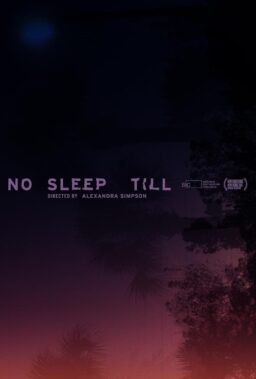“Kokomo City,” an award-winning documentary from the festival’s NEXT section pulls off an impressive feat in getting us to better understand the experience of the four Black trans women sex workers it follows. There is no greater plot to this movie, but it doesn’t need it: “Kokomo City” is a raucous compilation of charismatic storytellers gathered in the most lively way possible. Fittingly, director D. Smith’s black-and-white camera often looks up at her stars as they share their thoughts about their work and sense of selves.
The women interviewed here—Liyah Mitchell, Dominque Silver, Koko Da Doll, and Daniella Carter—are scholars of their experience. Smith empowers them throughout, giving them space in the edit and with each extreme close-up of a weaponized body part, sometimes in slow motion. The editing by D. Smith—who also filmed it—has essential energy and offers a prismatic look at such an intricate topic. These women have revealing, heartbreaking, sometimes hilarious stories to tell about their own lives and the many thoughts they have gathered from dealing with men (in this case, a large number of Black men) who seek to exploit them and sometimes push for secrecy. Meanwhile, Smith also interviews men who desire trans women, and they too speak freely. Smith has a smattering of monologues at her disposal and cuts them with a great deal of humor and free spirit, sometimes bouncing between one confessional and then a reenactment.
The one major setback to Smith’s raw vision—which includes a black-and-white that’s never afraid of blowing out a lit background behind its figure (pure Sundance!)—is the wall-to-wall, non-specific choice of music. But there are plenty of more distinct and memorable pieces to this documentary, one that thrives on making its art out of visibility and honesty.

The World Cinema Documentary entry “Twice Colonized” gets personal with an extraordinary woman named Aaju Peter. She was born in Greenland where she soon became “Whitenized” by the government, put in different families and schools for a good education, and removed from her culture and family. Now, she lives in Canada, where she landed after getting away from a place that can make her angry—it’s painful for her to speak Dutch. The film has a “Lived By” credit for Peter, and it follows this fascinating figure as she faces the past, present, and future of who she is and what she stands for.
Peter has become an advocate for Indigenous cultures being able to represent themselves against colonizing governments—the beginning of the movie depicts how she tried to stand up for the Inuk right for seal hunting as part of their economy before a harmful ban came into place (a chapter that could have used more time, or at least makes for a jarring introduction). Peter’s life’s work is about striving for that independence while also being a free spirit who loves to dance on hotel beds.
Her work is made all the more visceral by the bits of her life that show how she too seeks strength. There are scenes where we hear about an abusive relationship with her boyfriend, and in her own words, she notes how the colonization she experienced as a child has connected. “I didn’t realize how colonized my mind was,” she says. “And my relationship to others is a manifestation of this.” She experiences a horrible loss early into the documentary’s filming, and “Twice Colonized” gently factors it into the larger health crisis affecting her community.
This portrait by director Lin Alluna—a white Dane—can sometimes be unfocused in a way that impacts its editorial rhythm, and sometimes the historical background feels a little unclear. But “Twice Colonized” is the case of a movie in which the power and charisma of its subject hold it together. Watching Aaju Peter in her efforts and reflections becomes an emotional, artful journey. And Alluna and her team show affection for Peter’s story with their rich cinematic presentation, like Super 8mm dreamy sequences or with gorgeous string suites by Olivier Alary, Celina Kalluk, and Johannes Malfatti.

Biopics are usually acts of love by default, but the US Documentary Competition title “Little Richard: I Am Everything” bursts with admiration more than films like this usually do. Director Lisa Cortes takes her title to full tilt, with explosions of supernovas and particles covering the footage she presents of the rock ’n’ roll icon Little Richard. It becomes an artful conceit here for an otherwise standard bio-doc.
Cortes presents a cradle-to-grave story about the musician, including bits about how his ascendance in the music industry revolutionized rock and roll as we know it. It was in his locomotive-inspired rhythms, his brash queerness (which also made him “non-threatening” to white audiences), and his zeal behind the piano. “His DNA was everywhere,” one of the doc’s many talking heads says. His piano playing is focused on in particular, the way he turned it into almost a percussive instrument, which helped ignite certain hits like “Tutti Frutti.” In the discussion of sex and music, the doc has a hilarious openness about that song’s explicit meaning and how Little Richard got away with it.
Cortes has many big-name-influenced figures to talk about how important Little Richard was to them, like John Waters who shares his love for the music as a teenage epiphany (one that he wears with his own pencil mustache). And Billy Porter’s insight doubles as gratitude: “Sometimes simply existing is a revolutionary act.” Along with the footage shown of Little Richard’s rollicking concerts and lively piano playing, Cortes has people performing Little Richard songs, on guitar or piano, to pay tribute to how Little Richard’s music evolved throughout time. These musicans add to the film’s collective charisma, along with the scholars who provide great context about why certain facets of Little Richard’s work and personality were so revolutionary.
Yet while the documentary effectively praises Little Richard’s impact, it doesn’t go too deep. In particular, “Little Richard: I Am Everything” doesn’t get enough into the stuff it raises about his queerness or later religious fervor, and how he made those parts work within his overall mission of being himself. The rock ’n’ roll energy within Little Richard was incredibly complicated, starting with a sense of identity this film doesn’t dive enough into.
But as a film made to get people to talk more about Little Richard in the scope of rock ‘n’ roll, the film prevails. At its best, “Little Richard: I Am Everything” best fosters a general understanding of his music and makes you want to dig deeper into his art.












